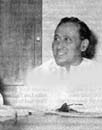
Commentary/Ashok Mitra
Anachronisms are just that, why waste space even to report their demise?
 Bejoy Chandra Bhagabati possessed huge commonsense.
He knew he was an anachronism, and it would be better not to be
around. The nation is supposedly celebrating 50 years of Independence
this year. Bhagabati took the hint and bade adieu. He was 96.
Bejoy Chandra Bhagabati possessed huge commonsense.
He knew he was an anachronism, and it would be better not to be
around. The nation is supposedly celebrating 50 years of Independence
this year. Bhagabati took the hint and bade adieu. He was 96.
His death has been duly reckoned as an unimportant
event. Most newspapers did not bother to carry even the two line
bit of agency news. There is no point in lamenting this collective
absentmindedness on the part of the media: anachronisms are just
that, why waste space even to report their demise?
True, men like
Bhagabati constituted a rare breed. He was a political leader
honest to the core, a Gandhian till the very end. He did not deviate
from his loyalty to the Congress and yet had admirers and friends
cutting across the entire political stratum.
Few will now remember some of his other personal
qualities -- or his other achievements. He was, once upon a time,
a member of the Union council of ministers. He was also, for more
than one term, president of the Indian National Trade Union Congress.
In the emerging circumstances, a person with this background should
have rolled in opulence; he would have flaunted the opulence too.
Bhagabati stuck to his ordinary ways; he made little money, despite
his near 80 years in state and national politics. He led an austere,
almost spartan, life. Another small point worth stressing: not
only did he not put by a nest egg for himself; he did not allow
members of his household either to gain pecuniary or any other
advantage from their relationship with him.
Otherwise a soft-spoken man, when the occasion arose
to express his views firmly and forthrightly, he would do so.
He was proud, extraordinarily proud of Assam and its literate,
culture and heritage. He was aware of the crawling tragedy that
was, in the manner of an historical inevitability, threatening
to overtake his state and the rest of the North-East. He without
question nurtured grievances against the colossus of Aryavarta.
But it was not his style to be rude or strident or to be combative
or cantankerous. An Assamese to the core, he was
also a great Indian.
No surprise attaches to the fact that he was squeezed
out of the party leadership by the mid-1970s. He did not possess
the flamboyance of a Dev Kanta Barooah; he was, besides, organically
incapable of indulging in skullduggery. If you yourself do not
accumulate wealth, you are a bad bet to help others amass assets
and property. Bhagabati's circle of admirers therefore shrank
rapidly. He became a has been. Not just his advancing age, it
was the non-relevance of his being around which was the principal
contributory factor for his inability to make the headlines over
the past two decades. The present crowd of career builders will
take at face value the claim that his failure to stay on the track
was on account of his lack of inclination to follow the track.
One can only speculate on the shape Indian politics
might have taken if men like Bhagabati had stayed at the helm
of affairs in their respective states, or in the administration
of New Delhi, or alternated between the two spheres of responsibility.
Ambitious individuals of assorted descriptions have, during the
past five decades, used the plank of states' rights or ethnic
prerogatives to thrust themselves into political prominence, and
have used this prominence as legal tender to buy a niche in the
nation's capital.
Perambulations of this kind were not reconcilable
with Bhagabati's portmanteau of beliefs. Work amongst tea garden
labourers, so as to raise their earnings and living conditions,
made him a trade union leader of stature, and nudged him into
national limelight. His roots nonetheless were in Tezpur, and
he returned to his roots after his stint at the centre and with
the INTUC was over.
Another of the contradictions ceased to be a contradiction
with him: he was proud of Assam, he was unhappy with the often
supercilious manner in which the problems of the North-East were
dealt with by the authorities in New Delhi, he would try to quietly
convince whoever would condescend to spare a moment for him that
alienation of Assam's youth and the rapidly spreading insurgency
in the rest of the North-East are reflective of a very deep economic
malaise.
Tell us what you think of this column
|





